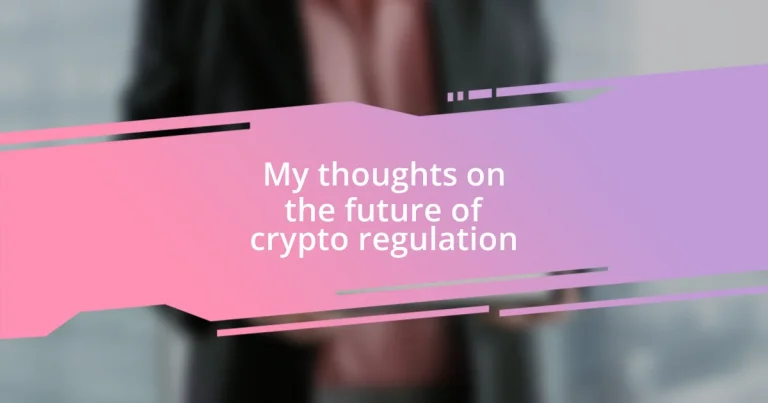Key takeaways:
- The regulatory landscape for crypto varies significantly across countries, with the U.S. having a complex patchwork of regulations compared to Japan’s structured approach that fosters innovation.
- Challenges in crypto regulation include rapid technological changes, varying global acceptance, and the need for a balance between consumer protection and innovation.
- Future trends may emphasize harmonized regulations, privacy alongside transparency, and the use of regulatory sandboxes to encourage safe experimentation within the industry.
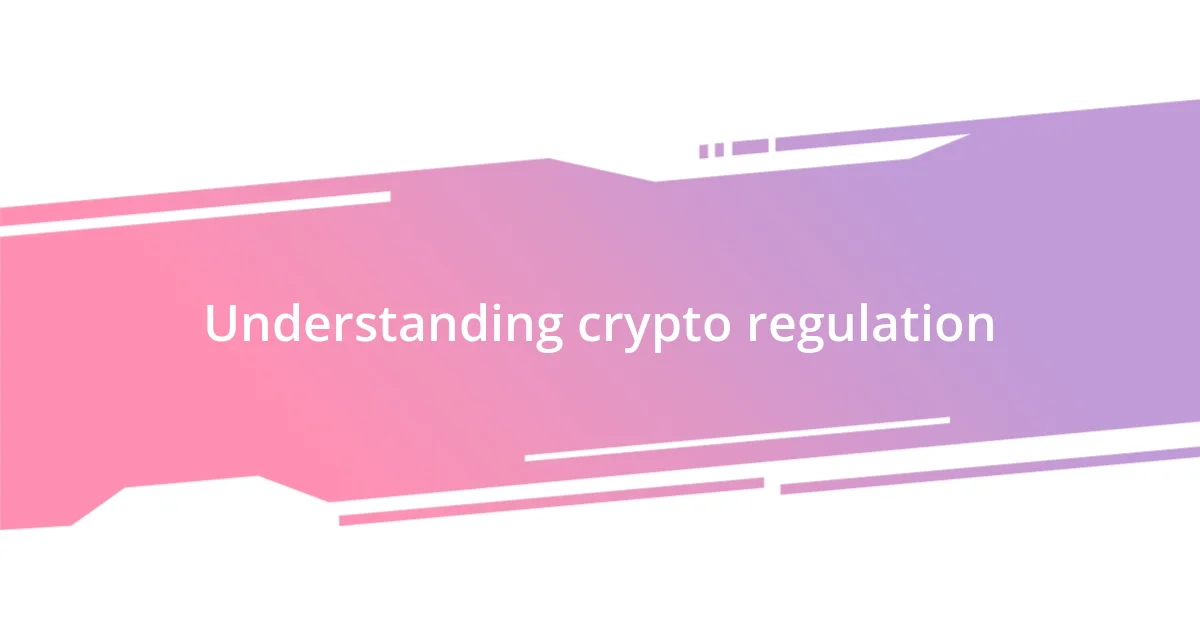
Understanding crypto regulation
Understanding crypto regulation can feel like navigating a winding labyrinth. As someone who’s been deeply immersed in discussions and debates about this topic, I find it interesting to see how different countries approach it. Some, like the U.S., are very cautious, often moving forward with a patchwork of regulations, while others, such as El Salvador, embrace crypto more openly. Why does that variance exist?
When I first dove into the crypto world, I was fascinated but equally perplexed by the lack of clear regulations. I remember attending a seminar where a regulatory expert emphasized, “We’re in uncharted waters.” That phrase stuck with me because it encapsulated the uncertainty many of us feel. Regulations are meant to protect investors, but they can also stifle innovation. What’s the right balance here?
I believe understanding crypto regulation is about grasping the delicate harmony between ambition and responsibility. As the landscape evolves, regulators will need to adapt while encouraging innovation. I’m often left pondering, how can regulations foster growth without choking the very essence of what makes crypto exciting? It’s a complex relationship that needs continuous dialogue.
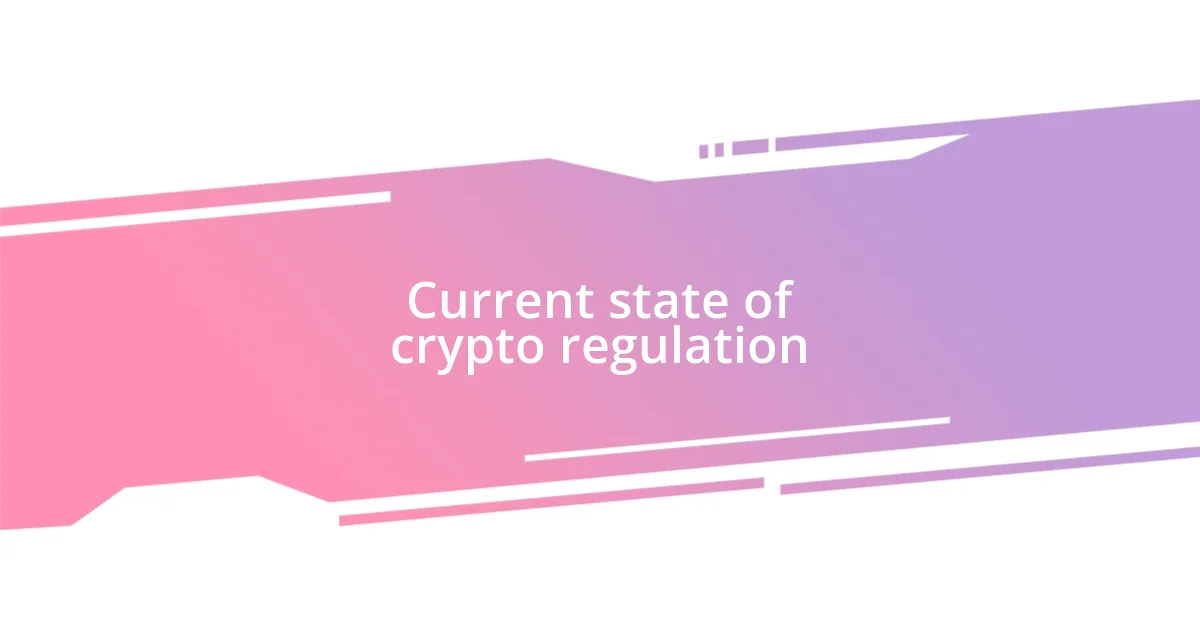
Current state of crypto regulation
The current state of crypto regulation is indeed a fascinating topic. As someone who has been following these developments closely, I’ve noticed how varied the regulatory approaches are across different nations. For instance, in the U.S., the landscape is often described as a mix of state and federal regulations, creating confusion for many investors. I remember a time when I was overwhelmed by the sheer number of regulatory updates coming from various agencies like the SEC and CFTC. Each announcement felt like a puzzle piece that didn’t quite fit anywhere.
In contrast, countries like Japan have implemented a more structured framework that has given legitimacy to crypto exchanges and encouraged innovation. I can’t help but feel a sense of optimism when I see how Japan’s proactive stance has benefited their tech ecosystem. That’s a reminder of how essential it is for regulations to not just exist but to facilitate growth. The willingness of some jurisdictions to embrace digital currencies, as has been seen in various European nations, highlights a stark difference in attitudes towards crypto that can shape investor confidence and participation in the market.
Now, as we look at emerging regulations, many are focused on enhancing consumer protection while grappling with issues like money laundering and fraud. Reflecting on my own experiences, I’ve often had discussions with peers who are worried about these regulatory advancements potentially stifling innovation. It raises a crucial question: can we truly find a balance that protects investors without squashing the entrepreneurial spirit of the blockchain community? I find it vital to keep this dialogue open as we move forward into a rapidly developing landscape.
| Country | Regulatory Approach |
|---|---|
| United States | Patchwork of state and federal regulations |
| Japan | Structured framework promoting innovation |
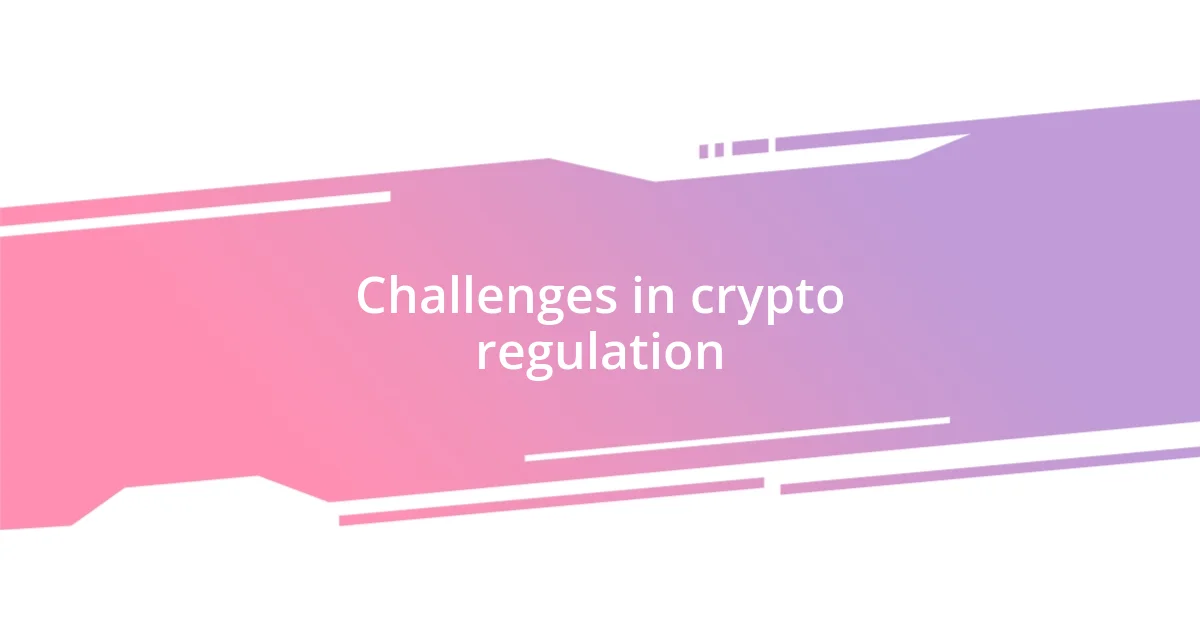
Challenges in crypto regulation
As I reflect on the challenges in crypto regulation, it’s evident that the pace of innovation often outstrips the ability of policymakers to keep up. I remember a time when I encountered a new decentralized finance (DeFi) platform, and I couldn’t help but marvel at its potential while simultaneously worrying about the lack of oversight. That duality—excitement mixed with apprehension—is something many investors and regulators grapple with. How can we ensure safety without imposing too many constraints?
The intricate nature of cryptocurrencies brings forth several hurdles for regulators:
- Rapid Technological Changes: Innovations like smart contracts and NFTs emerge daily, making it hard for regulations to stay relevant.
- Global Discrepancy: Countries have varying levels of acceptance and enforcement, leading to potential arbitrage opportunities for bad actors.
- Lack of Expertise: Many regulators may lack the technical understanding necessary to craft effective regulations, which can result in poorly designed rules.
- Balancing Act: Finding a middle ground between protecting consumers and fostering innovation remains incredibly difficult.
Navigating these challenges requires a committed dialogue, and I hope my concerns resonate with others in the blockchain space.
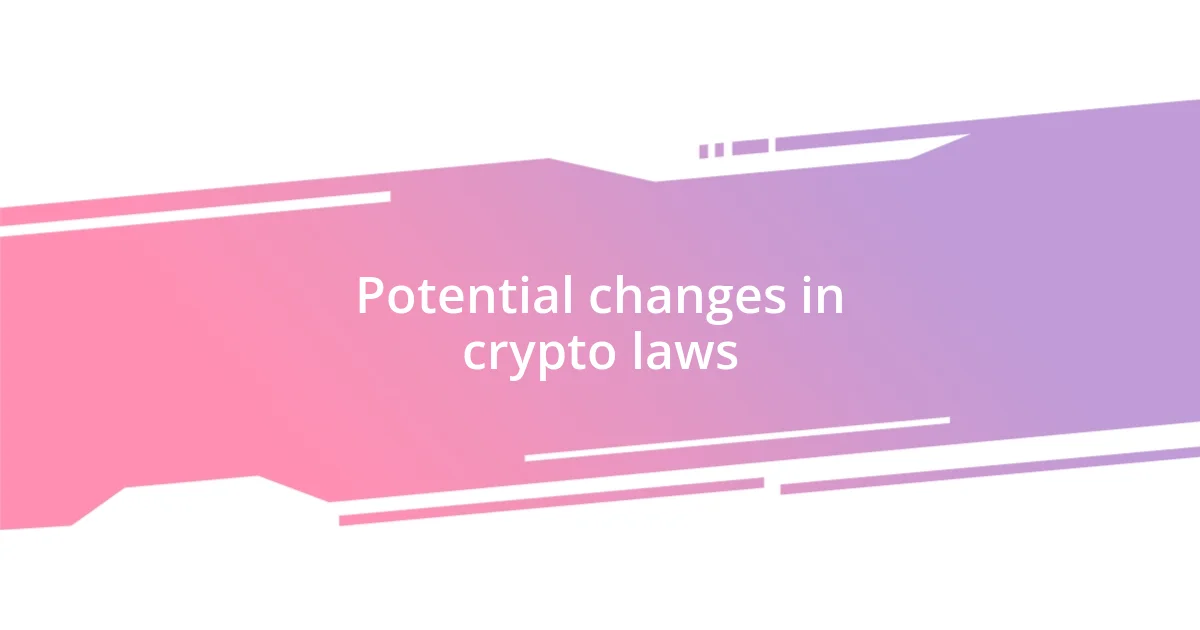
Potential changes in crypto laws
As I think about potential changes in crypto laws, I can’t help but wonder how they’ll impact the market dynamic. Many experts predict a shift towards more harmonized regulations, which might alleviate some of the confusion that currently exists. Just the other day, I was chatting with a developer who expressed relief at the prospect of clearer guidelines. It reminded me that the community is yearning for stability and security in their operations.
There’s also a growing momentum for regulations surrounding stablecoins and decentralized finance (DeFi). I recently attended a webinar where participants discussed the importance of transparency for these financial instruments. It struck me that if regulations go too far, they could unintentionally hinder innovation. How do we ensure that creators can still explore new frontiers while complying with emerging laws?
One area I find particularly intriguing is the possible global collaboration on crypto standards. I remember a recent panel discussion where industry leaders spoke about the need for a unified approach to combat fraud and promote consumer confidence. It made me optimistic that, perhaps, we could move toward a future where participating globally in the crypto ecosystem doesn’t feel like navigating a minefield. The question remains: will politicians and regulators embrace this vision of cooperation?
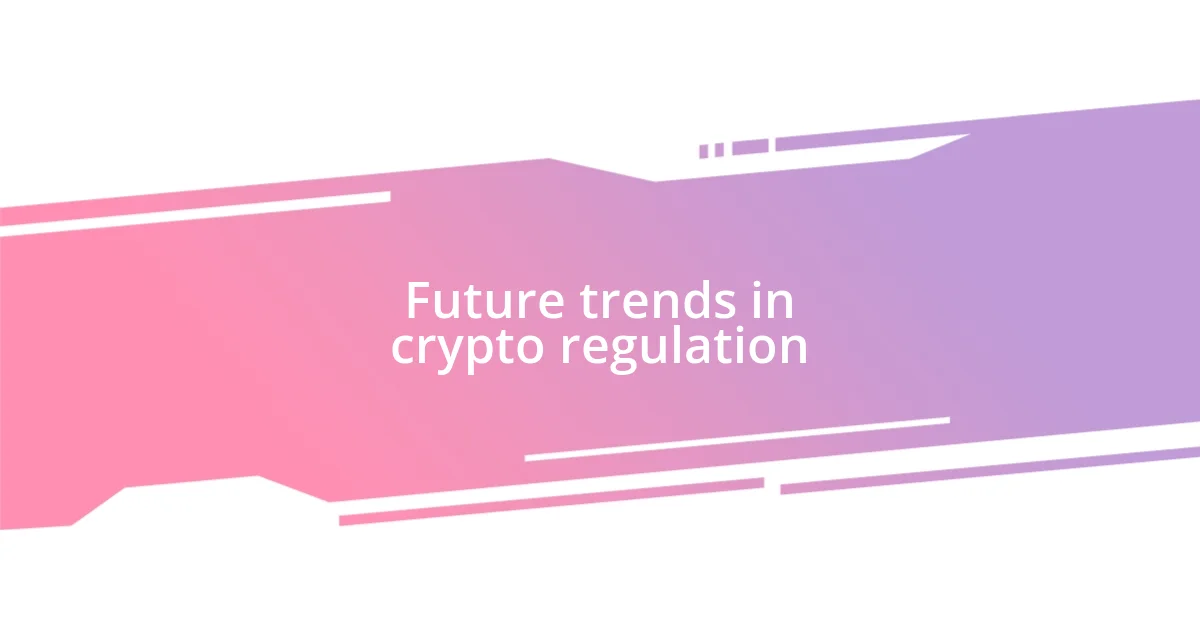
Future trends in crypto regulation
I anticipate that future trends in crypto regulation will lean towards a more comprehensive framework, especially as the demand for consumer protection grows. I recall a conversation with a friend who was hesitant to invest in cryptocurrencies simply because of the unpredictable nature of the market. This sentiment is common. It’s clear that regulators will need to instill confidence without stifling innovation. Will they strike the right balance?
Moreover, I see a potential rise in the emphasis on privacy regulations. With increasing public concern over how personal data is used, I believe regulators will need to consider user privacy alongside anti-money laundering (AML) measures. Interestingly, I recently read about a startup focused on blockchain technology that prioritizes user anonymity. It’s fascinating how this dual focus could shape the regulatory landscape — can we really have both transparency and privacy in the crypto space?
Finally, I suspect we might see regulatory sandboxes becoming a norm. These controlled environments allow for experimentation with new products while ensuring compliance. In my experience, such frameworks can lead to innovative solutions that abide by regulations. I wonder, how many creative ideas could emerge if regulators embraced this approach? The potential for collaboration between tech innovators and regulators truly excites me.
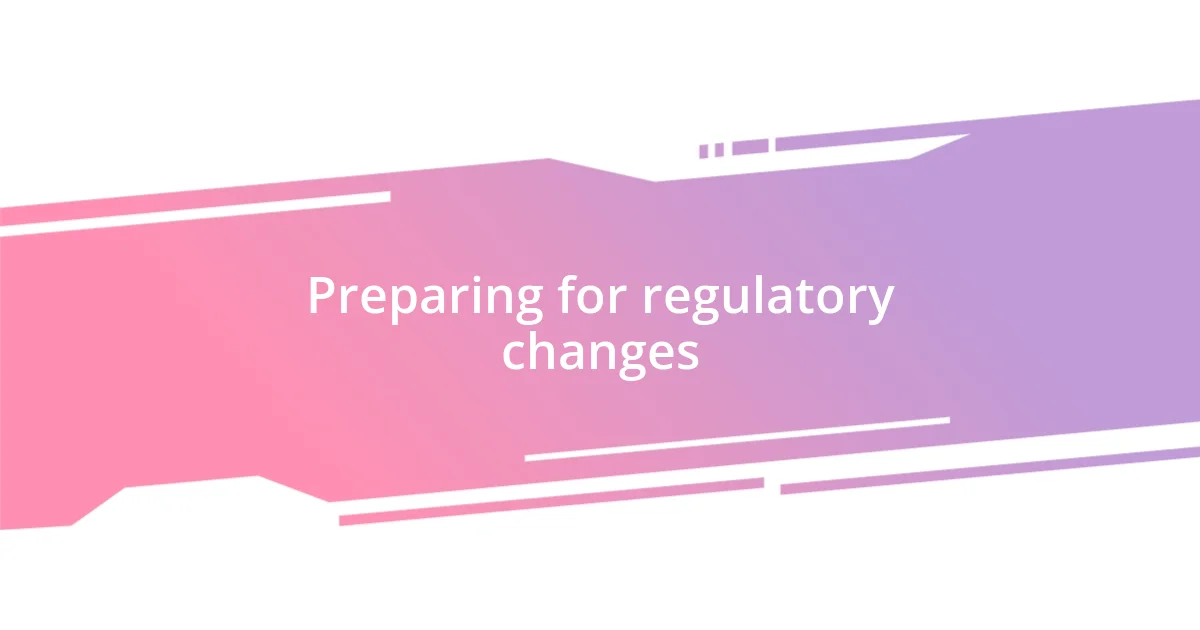
Preparing for regulatory changes
Preparing for regulatory changes in the crypto space feels a bit like gearing up for a storm; you can sense it approaching, and you know adaptability is key. I remember the days when market volatility kept me on edge, but now, with changes on the horizon, I find myself asking how I can navigate this new landscape. One thing is certain: staying informed about regulatory developments is crucial. Regularly checking updates can help us anticipate shifts and refine our strategies.
I’ve also noticed that discussions around compliance are becoming more prevalent within the crypto community. Just recently, I joined a workshop where participants shared best practices for aligning with potential regulations. The atmosphere was charged with a mix of anxiety and hope—many were eager to adapt, but unsure of the roadmap ahead. It led me to reflect: how equipped are we really to embrace these changes? The answer lies in proactive engagement and collaboration among industry players.
On a more practical note, I’m starting to think about the tools and resources I’ll need to stay compliant. For instance, leveraging analytics software to track transactions could be invaluable as new tax obligations surface. I’ll never forget a colleague who faced hefty penalties simply because he hadn’t kept up with regulatory updates. It made me realize how staying ahead of the game isn’t just smart; it’s essential. What steps will you take to prepare for this evolving landscape?












